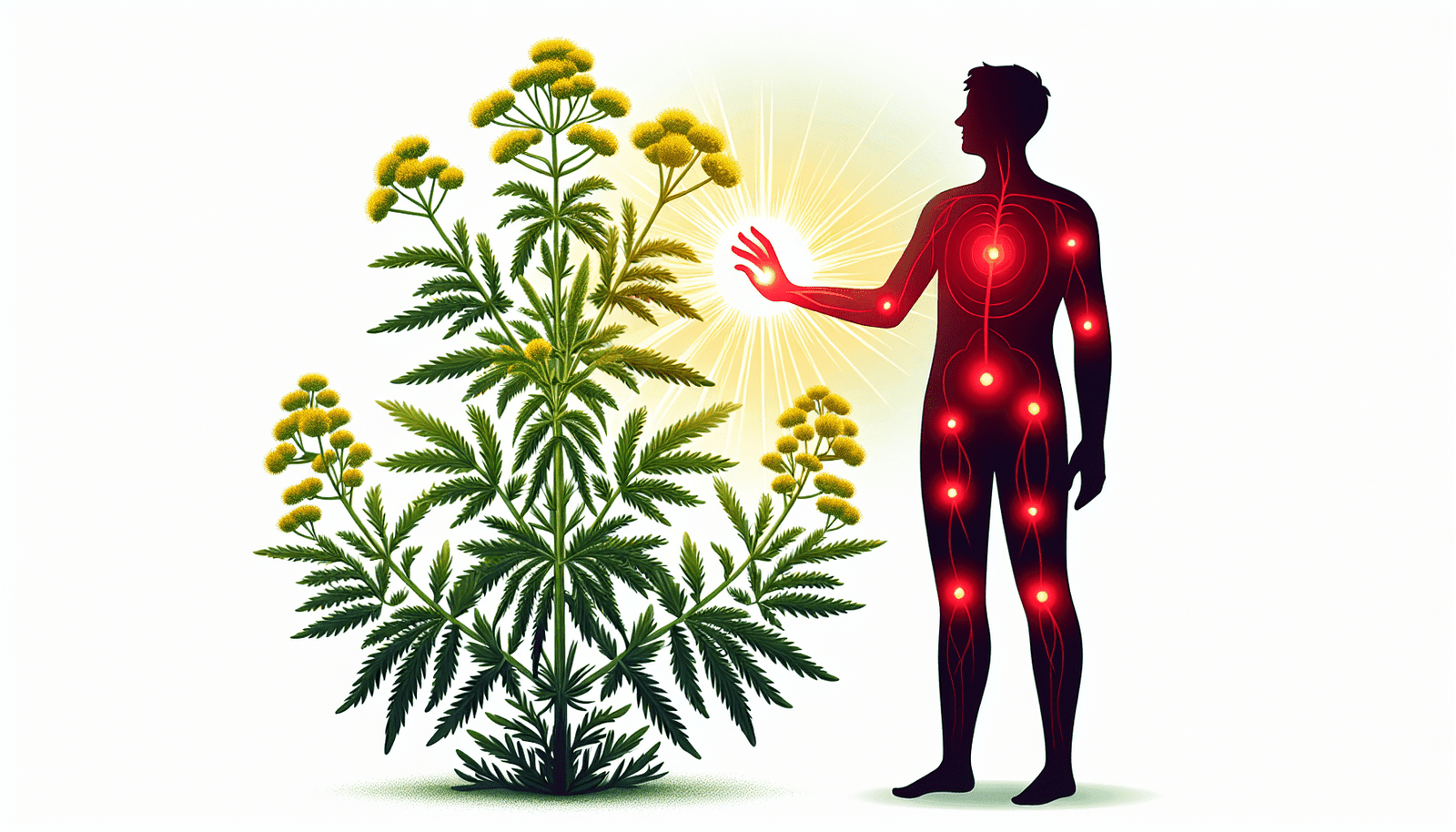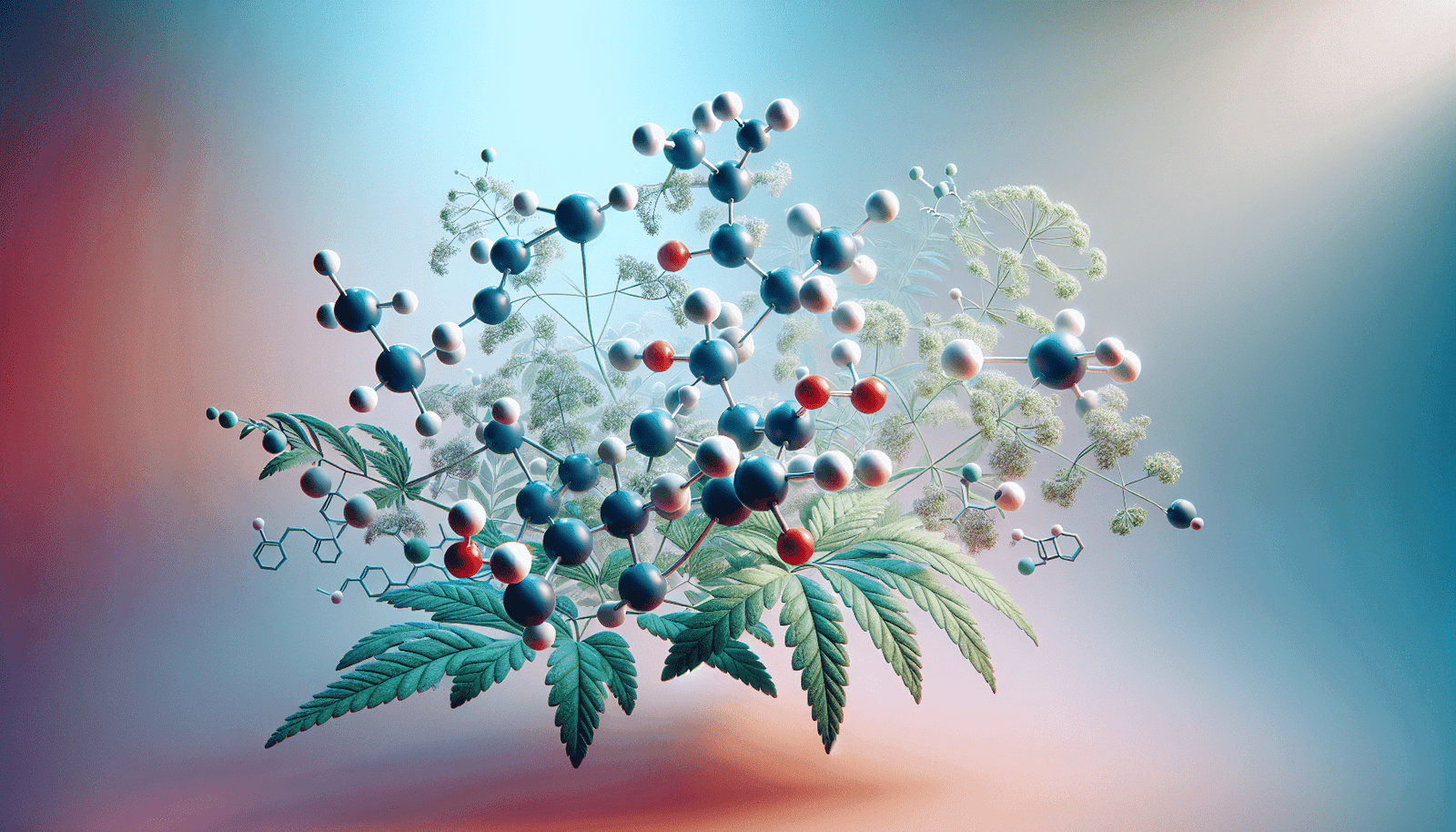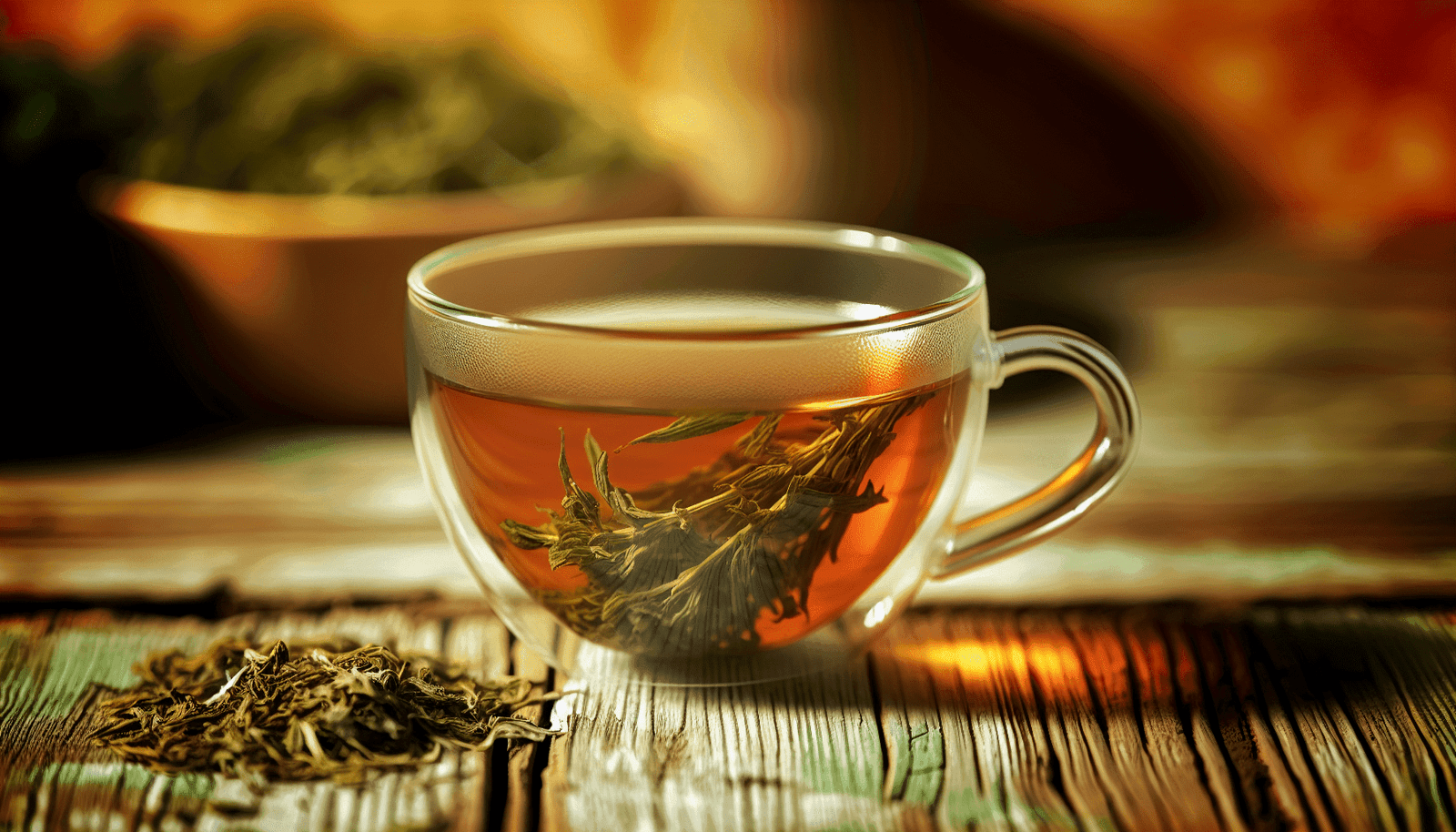Artemisia Annua (also known as Sweet Annie or Sweet Wormwood) has always been valued in traditional Chinese medicine (TCM) for its medicinal properties. In this article you will learn how Artemisia Annua can provide a modern solution to health problems. Join us on a journey through the healing power of Artemisia Annua tea and learn how to prepare it and what possible side effects you should be aware of.
At a glance:
- Traditional and modern application: Artemisia Annua has been used for centuries in traditional Chinese medicine for a variety of ailments and has established itself in modern medicine, particularly in the treatment of malaria.
- Potential health benefits: Studies and traditional uses point to the potential effectiveness of Artemisia Annua in improving digestion, strengthening the immune system, killing germs, relieving inflammation and possibly even fighting cancer cells.

Inhalt
ToggleArtemisia Annua in Traditional Medicine
Artemisia Annua, in Chinese Medicine known as Qing Hao, contains a variety of potential medicinal properties that are traditionally used in Asia and Europe. The herb’s versatility extends to the treatment of various ailments. These treatments include:
- Gastrointestinal complaints
- Expulsion of worms and parasites: In addition to malaria, effective control of uncomplicated cutaneous leishmaniasis is often reported.
- Improving digestion: The bitter compounds in the herb could stimulate gastric juices and bile and thus aid digestion.
- Strengthening the immune system
- Relief from inflammation
However, it is important to emphasize that many of the traditional uses of Artemisia Annua are based on anecdotal reports or preliminary laboratory studies. While some uses, such as the anti-malarial effect, are well established and supported by clinical studies, other potential health benefits require further research to confirm their efficacy and safety.
Artemisia Annua in Modern Medicine
In modern medicine, Artemisia Annua has made a name for itself above all in the treatment of malaria. The reason for this is the active ingredient Artemisinin, which is contained in the essential oil of the plant. It is considered the strongest antimalarial agent available and is a crucial component in the fight against this disease. Artemisinin is a key ingredient in antimalarial drugs recommended by the World Health Organization. Additionally, artemisinin derivative combination therapies are used to enhance treatment effectiveness and combat resistance.
In 2015, researcher Youyou Tu was even awarded the Nobel Prize in Medicine for her discovery of the role of Artemisinin against malaria. However, the emergence of Artemisinin resistance poses significant challenges to its continued effectiveness.
Some laboratory studies have also provided evidence that Artemisinin could fight cancer. In test tubes, Artemisinin was able to slow down the growth of cancer cells or even kill them. Also a Study on women with colorectal cancer found that women who were treated with Artesunate (a Artemisinin derivative) in addition to surgery lived longer. However, this study was only carried out on a small test group and is therefore not very conclusive.

Artemisia Annua and Cancer: Artemisinin Induces Apoptosis
As already mentioned, there are some laboratory studies that suggest that the Artemisinin of Artemisia Annua could have an effect against cancer cells. At least in the Petri dish… Of course, such results cannot be transferred 1:1 to the complex human organism, but initial clinical studies on humans have already provided positive indicators. The mode of action of Artemisia Annua against cancer can probably be attributed to several mechanisms of action of the active ingredients. The Arteminisin could therefore:
- Initiate programmed cell death in cancer cells. Specifically, Artemisinin induces apoptosis, leading to the destruction of cancer cells.
- Weaken the cancer cell’s natural protective mechanisms against programmed cell death.
- Inhibit the growth of tumors by preventing cancer cells from spreading, invading neighboring tissue and maintaining themselves via special cancer stem cells.
- Destroy cancer cells by accumulating harmful fats that lead to cell death.
- Disrupt the signaling pathways in cancer cells.
- Alter the effect of hormones on cancer cells, which can inhibit the growth of certain hormone-dependent tumors.
In various studies, cells from several types of cancer such as breast, lung, colon cancer and leukemia could be fought using the active ingredients from the medicinal plant. While these results sound promising, further research is needed to confirm Artemisia Annua as a miracle cure for cancer.
Artemisia Annua Tea to Support Digestion
If you’re looking for natural ways to support your digestion, Artemisia Annua tea could be just the thing for you. The medicinal plant has a special affinity with the digestive system and can help to improve your digestion in various ways:
Stimulation of Bile Production
One of the most remarkable properties of Artemisia Annua is its ability to stimulate bile production. Bile, a fluid produced by the liver and stored in the gallbladder, plays a crucial role in the digestion of fats. By stimulating bile production, Artemisia Annua could help to improve fat digestion. This thesis is supported by Studies.
Relief from gastrointestinal complaints
From flatulence to cramps – Artemisia Annua tea is traditionally used to relieve a variety of gastrointestinal problems. Its antispasmodic properties may help to reduce cramping and discomfort in the digestive tract, while its general calming effects may help to relieve bloating and other digestive discomforts.
Antiparasitic Effect
Artemisia Annua is also known for its antiparasitic properties. Parasites in the digestive tract can cause a variety of problems, from discomfort and bloating to more serious illnesses. Regular intake of Artemisia Annua tea could help to combat intestinal parasites and thus promote the overall health and functioning of the digestive system (Squires et al., 2011).

Do you already know Cistus tea? It has similar effects to Artemisia Annua.
Artemisia Annua Effect on the Psyche
The effect of Artemisia Annua on the psyche is an area that has not yet been extensively researched. Some traditional uses suggest that the plant may have calming properties that help with restlessness or sleep problems. It is thought that certain constituents of Artemisia Annua, such as the essential oil and possibly other as yet unidentified components, may have a mild sedative effect that is beneficial for anxiety and stress. However, these effects are largely anecdotal and only supported by a few studies (Emadi et al., 2011), (Perazzo et al., 2003).
Despite the potential for a sedative effect, individuals considering Artemisia Annua for its mental effects should do so with caution and seek professional medical advice, as the effects on the mind can vary greatly from individual to individual and potential risks are not yet fully understood.
Does Artemisia Annua have Anti Inflammatory properties?
Preclinical studies in the laboratory and with animals indicate that Artemisia Annua tea has anti-inflammatory properties. While the preclinical data is promising, there are only a limited number of clinical studies investigating the anti-inflammatory effects of Artemisia Annua in humans. These studies are often small, preliminary or insufficiently comprehensive to draw definitive conclusions.
The potential anti-inflammatory effect of Artemisia Annua could open up treatment options for autoimmune diseases such as Crohn’s disease. First small studies with animals have delivered positive results in this regard.
Animal model experiments show that Artemisinin derivatives are effective against a variety of rheumatic diseases such as rheumatoid arthritis, osteoarthritis, lupus erythematosus, osteoarthritis and gout. They also show positive effects in lung diseases, neurological disorders, skin diseases, inflammatory bowel diseases and other inflammatory and autoimmune diseases.
Does Artemisia Annua fight arthritis?
For people suffering from arthritis, Artemisia Annua could be a great asset. Positive study results indicate that Artemisia Annua can alleviate arthritis. The study investigated the addition of Artemisia Annua extract (EAA) to conventional medications for the treatment of rheumatoid arthritis (RA). Patients who received EAA in addition to their standard medication showed a significant improvement in the reduction of pain, number of swollen joints and overall inflammatory markers compared to those who received standard treatment alone. In addition, these patients experienced fewer side effects. This suggests that Artemisia Annua could be supportive in the treatment of arthritis.
In another study in people with osteoarthritis who were given 150 milligrams of Artemisia extract twice daily for 12 weeks showed a reduction in joint pain symptoms compared to those who received a placebo. This indicates the potential benefits of Artemisia extracts in managing inflammatory symptoms.
However, it is important to note that the study was limited by its small sample size of only 42 participants. Furthermore, no additional benefits were reported in individuals who received a higher (300 mg dose) of the extract. This highlights the need for further research to confirm the efficacy of Artemisia extracts in the treatment of inflammatory symptoms.
Do you already know Cistus tea? It has similar effects to Artemisia Annua.
Annual Mugwort against Infections
Sweet Annie / Artemisia Annua is not only powerful in the fight against diseases such as malaria… it also has antiviral, antibacterial, antiparasitic and anti-fungal properties, making it a potential natural remedy for fighting infections. The plant’s substances, including artemisia annua essential oil, show strong effects against staphylococci, salmonella, hepatitis A and herpes, including antibiotic-resistant strains. This indicates the potential of Artemisia Annua as a natural antimicrobial agent and offers a holistic approach to fighting infections.
How to Make Artemisia Annua Tea

To prepare Artemisia Annua tea you will need dried leaves of the plant. Here is a simple guide:
- Determine quantity: For one cup of tea, use about one teaspoon of dried Artemisia Annua leaves. This amount can be adjusted depending on the desired strength of the tea.
- Infuse: Put the dried leaves in a tea filter or directly into the teapot and pour boiling water over them.
- Let it steep: Allow the Artemisia Annua tea to infuse for between 10 and 15 minutes. The infusion time depends on your personal preference – a longer infusion time results in a stronger tea.
- Filter: If you have put the leaves directly into the pot, strain the tea through a fine sieve into a cup. If you have used a tea filter, simply remove it from the pot or cup.
- Refine: You can refine the tea with honey, sugar or lemon as you wish.
Artemisia Annua Side Effects and Interactions
Despite all the incredible positive effects of Artemisia Annua, you should also be aware of the possible side effects. Excessive consumption can lead to toxicity and adverse effects, such as…
- Digestive disorders
- Kidney failure
- Nausea
- Vomiting
Therefore, responsible consumption under the guidance of a health professional is crucial. You should not consume Sweet Annie fresh, as the plant may contain small amounts of Thujone. This is a substance that can be potentially harmful. Drying reduces the Thujone content. You should therefore only use dried Sweet Annie.
Prolonged use beyond four weeks is not recommended due to uncertain long-term safety and potential side effects.
Certain individuals, such as pregnant women, those with a history of liver problems or those susceptible to the Asteraceae/Compositae family, should take extra caution and avoid consuming the herb due to the potential risk of liver problems and allergic reactions.
Individuals with a history of seizures may experience increased symptoms with the consumption of Artemisia Annua extract. Therefore, it is important to understand the safety profile of Sweet Annie before incorporating it into your routine.
Can Artemisia Annua cause Liver Damage?
There is some evidence that high doses or long-term use of Artemisia Annua can stress the liver and lead to damage. Regular monitoring of liver function may be advisable with prolonged use.
Artemisia Annua can potentially affect the metabolization of drugs in the liver, which may affect their effectiveness and possible side effects. Concomitant use with medications that can damage the liver could increase the risk of liver damage.
Talking to a healthcare professional before combining Artemisia Annua with other medications can help prevent potential interactions and side effects.
How to Use Artemisia Annua
Artemisia Annua can be taken in different ways, depending on the desired effect and the form in which it is available. The best method, in my opinion, is to prepare it as a tea, as this way you can take all the active ingredients of the plant holistically, rather than just individual extracts. Here are some common ways to take Artemisia Annua:
- Tea: Artemisia Annua is often prepared as a tea. To do this, pour about a cup of boiling water over a teaspoon of dried herb and leave to infuse for about 10-15 minutes. As a rule, it is recommended not to drink more than 2-3 cups per day.
- Capsules: Artemisia Annua is also available in capsule form, which allows for accurate and convenient dosing. The dosage for capsules varies depending on the concentration and manufacturer. It is important to read the instructions on the packaging and not to exceed them. Doses of 200-500 mg per day are common, but this can vary greatly depending on the product.
- Tincture: Tinctures are liquid extracts that are often soaked in alcohol. A few drops are usually dissolved in water and taken. The dosage for tinctures also varies. As a rule, you start with a few drops dissolved in water and taken up to three times a day. The exact number of drops should follow the instructions on the product or be discussed with a specialist.
- Essential oils: Essential oils of Artemisia Annua should not be ingested, but can be used for aromatherapy or in diluted form for topical applications.
- Extract: Extracts are often available in liquid or powder form and can be dissolved in water or consumed directly. With liquid extracts or powders, you should follow the manufacturer’s recommendations, as the concentrations can vary greatly.
Conclusion
From its traditional uses in treating digestive disorders to its modern application to treat malaria and possibly even cancer, Artemisia Annua truly stands out as a versatile medicinal herb. Its potential in supporting the immune system, relieving inflammatory symptoms and arthritis, and fighting infections and autoimmune disorders further underscores its value in promoting overall health. But remember, while the benefits are promising, it’s crucial to consume Artemisia Annua responsibly to minimize potential side effects. It’s all about harnessing the power of nature for health and well-being!
Do you already know Cistus tea? It has similar effects to Artemisia Annua.
Frequently asked questions
Annual mugwort (Artemisia Annua) is traditionally used to treat liver, gallbladder and stomach ailments and to expel intestinal worms. It is used as a powerful remedy for malaria and aids digestion, strengthens the immune system, kills germs, relieves inflammation and may even help fight cancer cells.
Artemisia Annua is traditionally associated with calming properties, and some users report a relaxing effect that could help with anxiety or stress. Although certain ingredients of Artemisia Annua could theoretically have a calming or even sleep-inducing effect, there is a lack of clinical studies that prove a direct psychological effect beyond doubt.
Due to the potential risk of liver problems and allergic reactions, Annual Mugwort is not suitable for pregnant women, breastfeeding mothers, those with a history of liver problems or those susceptible to the Asteraceae/Compositae family.
For the treatment of malaria, annual mugwort is generally recommended at a dose of 400-800 milligrams daily, with 500 mg twice daily for severe cases that are resistant to Artemisia therapies. However, you should always speak to a doctor or pharmacist to determine your individual dosage.
Artemisia Annua can help with digestion, inflammation, skin infections and killing parasites such as tapeworms.
It is recommended to enjoy Artemisia tea in moderate amounts, usually no more than 2-3 cups a day. In addition, it should not be consumed for more than 4 weeks at a time. The exact dosage and duration should be individually adjusted and discussed with a health professional, especially if you want to drink it over a longer period of time.
Artemisia Annua can be used as a tea, extract, tincture or in capsule form. For tea, usually use one teaspoon of dried herb to one cup of hot water and steep for 5-10 minutes. For other forms, please follow the specific instructions on the product or the recommendations of a healthcare professional.
Yes, Artemisia annua has anti-inflammatory properties. Studies suggest that the compounds contained in the plant, including artemisinin, can help reduce inflammation.
Yes, as with many herbs, it is possible to overdose on mugwort, especially if it is consumed in concentrated form such as tinctures or extracts. Symptoms of an overdose can include gastrointestinal complaints, kidney or liver problems. It is important to stick to recommended dosages and seek medical advice if you are unsure.
Yes, as with many herbs, it is possible to overdose on mugwort, especially if it is consumed in concentrated form such as tinctures or extracts. Symptoms of an overdose can include gastrointestinal complaints, kidney or liver problems. It is important to stick to recommended dosages and seek medical advice if you are unsure.
Mugwort tea can aid digestion, fight parasites and germs and relieve inflammation. It is also used against malaria.
Possible side effects of mugwort can include allergic reactions, gastrointestinal complaints and neurotoxic effects if consumed in large quantities. Mugwort can also trigger allergic reactions in people who are sensitive to the composite family.

